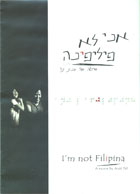
I’m not Filipina 2010
Distributed by Docs for Education, 10a Holland St., Afulla, Israel 18371; fax: 972-3-5291726
Produced by Anat Tel and Sasha Klein
Directed by Anat Tel
DVD, color, 52 min.
Sr. High-General Adult
Adoption, Area Studies, Child Development, Disability Studies, Human Rights, Multicultural Studies, Social Sciences
Date Entered: 10/11/2012
Reviewed by Meghann Matwichuk, Morris Library, University of DelawareI’m not Filipina drops the viewer into the life and routines of a mother-and-daughter pair facing unique struggles and circumstances. Six-year-old Krizel is blind. Her mother Janet is in Israel on a long-term work visa. She carves out a tenuous existence as a caretaker and housekeeper, while maintaining ties to other immigrants from the Philippines. Further complicating matters, Krizel was unofficially adopted by Janet shortly after her birth, and thus neither has special status in the eyes of the Israeli Immigration Authorities.
Krizel is Janet’s constant companion, accompanying her mother as she cares for her client and curiously examining her work. The viewer watches the child grapple with her desires, not least of which is her drive to be as independent as possible. She “doesn’t want to have a special teacher.” Janet respects the young firebrand’s wishes, and advocates for Krizel’s inclusion in a mainstream classroom. Like any child, Krizel also shows signs of ambivalence: asking for help when she doesn’t feel like completing a task, changing her mind about whether or not she wants to go to the Philippines with her mother. Late in the film, she gives words to these complex emotions: “I’m not special. I’m angry.”
The underlying concern that defines Janet and Krizel’s lives is the threat of deportation. Janet talks of how she lives in constant fear. She coaches Krizel on how to respond if she is taken away by Immigration Police. A futile attempt to explore surgical options that might improve Krizel’s sight is undertaken with the goal of buying time to remain in the country legally. Having lived in Israel her entire life, Krizel lacks Janet’s identity as a Filipina. In one telling scene, Krizel sings a patriotic song for the camera (“My Land of Israel”). Yet she attends anti-deportation rallies with her mother, celebrates her birthday with the local Filipino community, and goes with her mother to meetings with human rights advocates to discuss strategies that may help their case.
No narrator or voice-over tells the audience what to think of Krizel and Janet’s situation. The audience is not given historical background on Filipinos or other ethnic minorities in Israel. Footage is presented in a slice-of-life style and interspersed with subject interviews, giving viewers a sense of the rhythms and contradictions of the immigrants’ lives. This film is recommended for collections supporting immigration studies, and may be of interest to those supporting disability studies curricula as well.